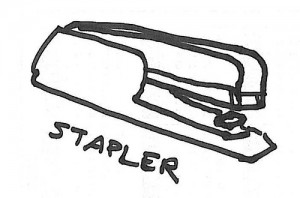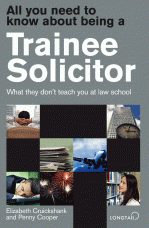How many hours in a day? – Elizabeth Cruickshank and Penny Cooper
We all know that there are 24 hours in a day, but do we always remember that we can maximise their usage through proper Time Management or TM?. This means managing your books, your notes, your surroundings, your day and yourself.

It’s all about structure
Have you ever thought why working in a library is so pleasant? It’s not just because you will find a flat desk, free warmth and friends to have a “quick” cup of coffee with when you are weary.
It’s because the information that you need has been helpfully arranged and made easy to locate by your librarian.
Replicating the library structure in your own work space will help you to avoid wasting time locating material before you get started on an assignment. You can do this by:
– Arranging books properly by subject or author on a bookshelf rather than on the floor.
– Sorting out notes in subject files with proper file dividers and a contents list at the front of each one file.
– Ordering documents into folders with sub-files to make information easy to locate on your computer.
– Getting your stationery stationary, together with all your other work paraphernalia. ‘A place for everything and everything in its place’ may sound like boring advice but searching for a stapler, which when located is devoid of staples, is not only time wasting but is likely to terminate your work session through frustration.
Contract hunt
The training contract process can generate a swamping amount of paper or computer space if you are not careful. Paper applications and correspondence can be most easily handled if you file them in firm alphabetical order with a contents list at the front of your file. The contents list should include the following to indicate how each individual application is proceeding:
– Date application was sent and to whom.
– Date acknowledgement was received (if any). If your application is not acknowledged after a couple of weeks, you may decide to send a polite enquiry, taking the same care that you did over the application and covering letter.
– Date of interview/assessment day. Make some very brief notes of your impressions of the firm, the interviewers and what you spoke about.
– The result of the interview. Don’t throw away rejection letters in disgust.
– The date by which you should provide an answer to an offer.
You will then be able to see at a glance how many applications are outstanding and if – and it does happen – a firm phones you up at short notice to ask you for interview, you will be able to find a copy of your application and covering letter. Trite as it sounds, it’s astoundingly important to remember in minute detail what you told your interviewing firm about yourself in your application.
Lists, oh where would we be without lists?
Shopping with a list is so much more efficient than shopping without one. You are less likely to forget items, you can save time by arranging your list in the order you will find items on the supermarket shelves (browsing wastes time and possibly money by encouraging impulse purchases) and most importantly your brain will have space to rehearse what you learned from that day’s lectures or to think through your opening speech for the moot the following week.
Making a list of what you have to do over specific periods should provide similar benefits. Many lawyers keep a paper ‘day book’ (really just an exercise book put to good TM use) or use their tablet PCs for noting tasks and deadlines. They know that by making a list you objectify your tasks and stop them wandering around your mind scattering dark mayhem. A simple list of everything that you want or need to do is a start, but adopting more sophisticated methods, as advocated by the many books written on TM techniques will produce even greater rewards.
Look at a TM strategy in the same way as a sensible fitness regime. Start slowly and build up, assessing what really works for you, because different methods will have different efficacy levels for different people. If one method doesn’t work then try another instead. Here are some suggestions:
– Keep a running list of tasks. Write down tasks as soon as they become apparent. Include social tasks as well, such as buying birthday cards and sending emails to your family.
– Always include completion dates.
– If a large task can be broken down into smaller tasks, set a completion date for each separate component of the task.
– Order tasks according to type e.g. ‘emails’, ‘phone calls’, ‘online research’ and tackle them in that order to save hopping from one ‘place’ to the next.
– At the end of your working day, take 5 minutes to cross out what you have achieved that day, then in preparation for the next day write a new list of ‘Urgent’ (or essential to do) tasks followed by a ‘DTD’ (desirable to do) list.
– Allocate what seems a reasonable amount of time to complete each task and if possible allocate specific time slots during the next day for their completion. This has a two-fold benefit. Time will not be wasted at the beginning of the next day assessing what to do and if the Urgent tasks take less time than anticipated you will be able to move seamlessly on to the DTD tasks.
Getting started and keeping going

Identify what is the best way for you get started. If you can’t settle to a major task when there are lots of little gnat-like tasks buzzing around, swat a few of them out of the way first, but without spending much time on them. But if it works better for you, leave the gnats to buzz and get your foot over the major task slug waiting to slip you up. (TM books are full of metaphors like this; we prefer gnats and slug-squashing to ‘eating frogs’).
Take a long-term view of your task list. As well as itemising the short-term ‘fire-fighting’ tasks (another TM metaphor), list those things that you hope or need to achieve at certain points over the next year. List them with completion dates and realistic stage completion dates, so that you know when they are coming up and are not caught unawares.
Always tick things off when complete and – for a morale boost, write down tasks you completed that were not on your original list, just to get the striking-out satisfaction.
Don’t work for so long at one task that your brain begins to ache. Mixing up tasks which require different types of concentration such as research, setting up meetings, writing drafts of assignments, discussing problems, arithmetical computations or document editing can enable your brain to function more efficiently. Changing direction from one task to the next will also give you natural short breaks to rest your brain muscle.
Tackling assignments
An assignment for three weeks in the future can be postponed for at least two. That is a common view, but it is not a sensible one. It is particularly not useful in an office context where there will always be information and documents required at short notice by your supervisor, just when you have settled down to focus on a substantial piece of work required for two days hence and which you knew about several weeks ago. Diarising a date for completing a major task two or three days ahead of the agreed deadline will automatically build in useful contingency time to enable you to cope with the unforeseen urgent matter that may demand your attention.
Develop an assignment survival strategy by breaking the assignment down into components and setting a date for the completion of each component:
– Analyse the question to make sure that you understand what you are being asked to do as soon as possible after you have been given the assignment, but certainly that day.
– Ask yourself what you need to know to complete the assignment.
– Ask yourself what you already know and make brief notes as you are thinking.
– Find the information to fill in the knowledge gap. Ideally this and the previous two steps should be completed by the end of the next two days.
– Read and digest the information. Allocate time in your diary for this, but make sure that you leave a week to….
– Produce a draft. And then at least 2-3 days to…
– Edit the draft to produce the final polished product.
This is a leisurely time-table, set out for a reasonably weighty assignment, but even when the task is a straightforward letter before action or a short capital gains tax computation, you should look at it as quickly as possible after you receive it. Remember that your sub-conscious mind can be busy considering problems and possible solutions …. but only if it knows that they exist.
Student and office life
Much of legal office life may be different from your expectations. As a student your life is your own, you can (but not too often) skip lectures to finish an assignment that would otherwise be late and, despite what we have advised above, you can work in complete chaos if you come up with the results in the end. You also have relatively long holidays from college, short working days and built in reading weeks. Developing good TM techniques whilst you have those time luxuries could drastically reduce your stress levels when reality bites in the office.
Part of your value as a trainee is simply to be organised, in terms of your office space, your time and the documentation you deal with. Being a solicitor is often as much about being practical as about being legally knowledgeable. You will get noticed and appreciated for such apparently simple things as ensuring that all documents for a large transaction are in the correct order for signing and that you have met the completion deadlines previously agreed with your supervisors.

Practising sensible Time Management now will inculcate efficient work strategies, which are likely to earn you substantial kudos when you are a tyro trainee. Being able to assess and indicate quickly how much work you have in hand, when it will be completed, the dates of any relevant court filing dates and being ready and prepared with the correct documents will form the basis of a good reputation within your firm. Hone your TM skills and reap the rewards now in your academic life later in your professional career.
Professor Penny Cooper of Kingston University and Elizabeth Cruickshank are the authors of ‘All you need to know about being a Trainee Solicitor’ (Longtail, 2008) and together with Boma Ozobia of “The Survival Manual for New Wigs” (Odade 2010).
